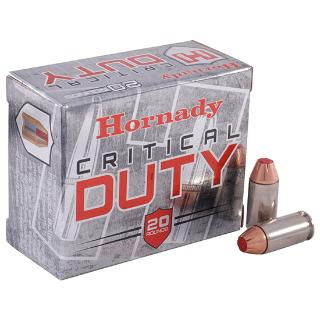Posted by Josh Sibley on Oct 30th 2017
Self Defense Ammo Selection
 If you've recently looked on the shelf in our ammo department or at your local gun shop, you've probably noticed a
If you've recently looked on the shelf in our ammo department or at your local gun shop, you've probably noticed a
plethora of defense rounds from various manufacturers. When making your selection, you could always go with what you've used in the past, but is there something better out there? Why is it better? What situations should it be used for? We'll try to help answer some of these questions because there are some great new choices out there that might work perfectly for you.
First and foremost, we're not recommending or promoting any of these rounds, they are simply subjects in this post to help understand what is available out there.
Before we dive into specific cartridges, let's go over some of the ammo basics. When it comes to self defense handgun ammo, most people look for two things - reliability and expansion. The reliability typically comes from two different things, feeding properly each time and going "bang" each time the trigger is pulled. Expansion is pretty self explanatory and that is how much the bullet expands upon impact.
Bullet Terminology: We'll keep this as basic as possible. When reading a box of ammo you'll likely see different acronyms like FMJ, TMJ, JHP, CPHP, etc. These are denoting the type of bullet each round is loaded with inside the box. In order of how they're written above, these would mean Full Metal Jacket, Total Metal Jacket, Jacketed Hollow Point and Copper-Plated Hollow Point. There are a few others, but these sum up the majority of bullets.
Full Metal Jacket - A solid piece of lead wrapped with another metal, typically copper.
Total Metal Jacket - A solid piece of lead wrapped entirely with another metal, typically copper. Most people would argue that FMJ and TMJ are the same, but some FMJ rounds don't cover the bottom of the bullet, they only cover what shows outside the brass casing.
Jacketed Hollow Point - A hollow point that is wrapped with another metal, typically copper.
Copper-Plated Hollow Point - A hollow point that is wrapped or "plated" with copper. Not much different than a JHP, they just denote the metal in the acronym.
So let's get into some specific cartridges...
Federal Guard Dog - This cartridge was designed for use inside homes and buildings. The problem this round solves is that with most FMJ rounds, you don't get much expansion. Expansion not only causes more injury to your potential target, but it also slows the bullet down when passing through objects such as drywall or plywood therefore lessening the chance of striking a family member in another room. For a JHP round to work properly, the hollow point cavity must fill with a fluid-like substance such as ballistic gelatin or flesh. These hollow point cavities however can fill with clothing materials, drywall, dirt or something similar and will not expand much upon impact causing them to act like an FMJ round and punch through walls with greater ease. The Guard Dog round is an FMJ round, but it is filled with a blue polymer ball that allows the rest of the bullet to expand upon impact and slow down the round and/or cause more damage. *Note: This round will pass through walls, but it is designed to stop faster than typical FMJ rounds. Please always know your target and what lies beyond your target.
Hornady Critical Defense - This cartridge is one of the most popular in the self defense market and its purpose is much the same as the Federal Guard Dog. Like Federal, Hornady realized the importance of expansion and that JHP rounds were not always doing the best job at expansion. Thus, Hornady developed the FTX bullet. At the nose of the FTX bullet, you'll find a Flex Tip. The Flex Tip is sitting inside the hollow point cavity and acts as a barrier to keep other objects from filling the cavity and also acts as the fluid agent to make the bullet expand upon impact. An added benefit of the Cirtical Defense line is low-light propellants. Hornady uses specific powders to ensure you aren't blinded upon firing one of these rounds which is nice because chances are if you're using it, it'll be in darkness. Also, Hornady has released that they'll be introducing a 223 REM version of the Critical Defense line for all of those folks using the AR-15 platform for home defense.
Hornady Critical Duty - This particular round was developed with law enforcement in mind, but it has certainly caught the eye of many self defense handgun users. For those of you that don't know, the FBI has a protocol for the bullets its agents use in the field. We won't go into the details of that here, but know that this round passes that test with flying colors. As a matter of fact, this round passed the FBI protocol even after passing through certain barriers like heavy clothing, plywood, glass, and drywall. Hence why Hornady refers to this round as being "barrier blind."
Liberty Civil Defense - This is a rather light round and it was designed that way on purpose. This is a lead-free round with a deep hollow point cavity. Lead-free means the round is lighter and in most cases when a round has a light bullet, there will be less felt recoil (such is also offered with Hornady Critical Defense Lite). The deep hollow point allows this round to expand even without containing the ever-so-malleable lead that most rounds have.
If you're not sure which ammo to choose for your self defense situation, give us a call, send us an Email or stop by the store and we'll be glad to guide you in the right direction. We have an incredible amount of combined knowledge and experience here at Dance's with ammunition, firearms and even reloading.
If you're ready to choose your next self defense round - take 5% off on us for reading this article and don't forget to share this article with your friends! Use coupon code: DEFENSE5

